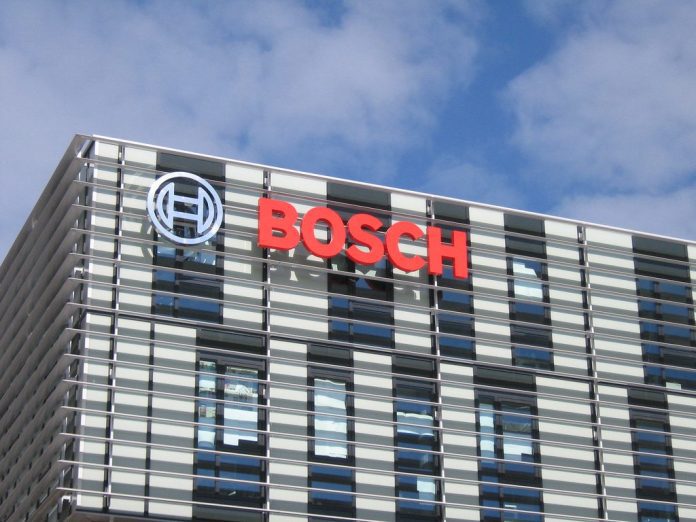Bosch said this week it has so far sold 10 million connected power tools, home appliances, and heating systems, and has added about €300 million in revenue by adding artificial intelligence (AI) to its product line since setting up an AI division three years ago. Its AI and IoT strategy was a bright spot in a tough set of financial results, capping a grim year for the wider industrial sector, and for the automotive market in particular.
Bosch posted sales of €71.6 billion for the 12 months to the end of 2020, down 4.4 percent on a year ago, and profit of €1.9 billion (€3.3 billion excluding restructuring expenses), on a margin of about 2.5 percent (4.5 percent). But the company generated free cash flow of around €5 billion, the highest in its history, and said it is weathering the economic storm well, all told.
The company continued with its message about combining AI and IoT – as AIoT, no less – in its sales portfolio and factory fixtures in order to get it through the ongoing global Covid-19 crisis, and t set it for new growth – with “opportunities in markets worth billions”, it said this week. More than that, it said it wants to “carve out a position [for itself]… worth billions”.
The company introduced the AIoT marketing portmanteau at CES in January, where it showed new AI-embedded gadgetry in a range of products, including fitness trackers, air quality sensors, and security cameras. It said this week the company had rallied in the second half of the year, after 2020 sales plummeted with lockdown, and falling automotive sales.
The Bosch Center for AI (BCAI) was established almost four years ago, in early 2017. It employs 270 specialists, and is “bearing fruit”, the firm said, adding €300 million to the company’s top line over the past 12 months. The unit is engaged in 180-odd projects in the mobility, manufacturing, smart homes, and agriculture sectors.
Bosch has added certain functions to its IoT proposition: an IoT suite to connect devices, a cloud infrastructure to process data, an AI platform for scaling-up of AI applications. Volkmar Denner, chief executive at Bosch, said: “The next step is to turn technical expertise into business.”
The company is looking to leverage its new ‘cross-domain computing solutions’ division, with 17,000 staff across 40 facilities in 20 countries, formed last year out of its twin automotive software and electronics units, to bring AI and IoT into vehicle componentry.
It won orders for vehicle computers worth €2.5 billion in the second half of 200, it said; “deals worth billions” will follow. Denner remarked: “The new division brings together hardware and software development for new automotive electronics architectures. This is our gateway to an emerging market driven by higher levels of intelligence in cars.”
He said: “By investing in areas of future importance, such as… IoT and AI, we are further expanding our innovation leadership. We want to become a leading AIoT company. On the strength of our broad domain knowledge and extensive expertise in electronics and software, we have more at our disposal than most of our competitors.”
Meanwhile, the company said it was climate neutral early last year, “according to in-house calculations”, across all 400 global sites. It wants to reduce CO₂ emissions by 15 percent “along the supply chain” by 2030, it said. “We kept to our word. Bosch [is] the first globally operating industrial enterprise to achieve climate neutrality,” said Denner.
The company has invested €5 billion in new electrical powertrains, and will spend €700 million in 2021, 40 percent higher than in 2020, on developing electrical mobility solutions, including fuel cells. Its new powertrain electrification business is growing twice as fast as the market, it said, and is worth “several billion euros”.
Since 2018, Bosch has won 90 powertrain electrification projects, including 30 last year, worth €7.5 billion. More than 2.5 million vehicles around the world currently feature Bosch electric powertrain components. Denner said: “In the foreseeable future, electromobility will become one of Bosch’s core businesses.”
In 2020, sales were down in every Bosch business unit with the exception of consumer goods (up 5.2 percent to €18.6 billion). Household appliances and power tools benefited, it said, from the general kick on home improvement in lockdown. But everything else went south.
Its mobility solutions division recorded sales of €42.3 billion, down 9.5 percent; its decline was a way short of the 15 percent slump for the automotive sector overall. Its industrial technology unit fell 16 percent to €5.1 billion.
Sales in Europe, North America, and South America were €38 billion, €10.8 billion, and €1.1 billion, down 5.7 percent, 14 percent, and 21 percent, respectively. Sales reached €21.7 billion in Asia Pacific, down 1.4 percent. Sales in China exceeded sales in Germany for the first time in Bosch’s history.
Bosch is forecasting growth of just under four percent in 2021, impacted by the continuing Covid-19 crisis, as well as potentially by developments such as Brexit and competition between the US and China.
Stefan Asenkerschbaumer, chief financial officer at Bosch, commented: “The crisis is not over. Despite all the challenges, it remains our goal to grow more strongly than the markets in the sectors and regions that are important for us. Our rigorous efforts to lower costs and boost competitiveness provide a sound financial basis from which we can expand promising new areas.”

